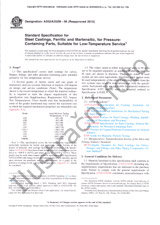Potřebujeme váš souhlas k využití jednotlivých dat, aby se vám mimo jiné mohly ukazovat informace týkající se vašich zájmů. Souhlas udělíte kliknutím na tlačítko „OK“.
ASTM D2274-14(2019)
Standard Test Method for Oxidation Stability of Distillate Fuel Oil (Accelerated Method)
Přeložit název
NORMA vydána dne 1.12.2019
Informace o normě:
Označení normy: ASTM D2274-14(2019)
Datum vydání normy: 1.12.2019
Kód zboží: NS-978806
Počet stran: 6
Přibližná hmotnost: 18 g (0.04 liber)
Země: Americká technická norma
Kategorie: Technické normy ASTM
Kategorie - podobné normy:
Anotace textu normy ASTM D2274-14(2019) :
Keywords:
diesel fuel, filterable insolubles, middle distillate fuel, oxidation stability,, ICS Number Code 75.160.20 (Liquid fuels)
Doplňující informace
| Significance and Use | ||||||||||||||||||||||||
|
5.1 This test method provides a basis for the estimation of the oxidation stability of middle distillate fuels such as No. 2 fuel oil. 5.2 The test method may not provide a prediction of the quantity of insolubles that will form in field storage over any given period of time. The amount of insolubles formed in such field storage is subject to the specific conditions which are too variable for this test method to predict accurately. 5.3 Test Method D2274 yields results more rapidly than Test Method D4625, the 43 °C bottle test. However, as a result of the significantly elevated temperature and the pure oxygen atmosphere, the nature and amount of insolubles may deviate to a greater extent than Test Method D4625 from those formed in field storage. |
||||||||||||||||||||||||
| 1. Scope | ||||||||||||||||||||||||
|
1.1 This test method covers the measurement of the inherent stability of middle distillate petroleum fuels under specified oxidizing conditions at 95 °C. Note 1: Fuels used in establishing the precision measures for
this test method were described as gas oil, diesel fuel, No. 2
heating oil, and DFM, a Navy distillate fuel suitable for diesels,
boilers, and gas turbines. (The term DFM is no longer used when
referring to fuel meeting MIL-F-16884 requirements; rather it is
called F76 as it conforms to NATO F76 requirements.) While the test
method may be used for fuels outside the range of these fuels, the
precision measures may not apply.
1.2 This test method is not applicable to fuels containing residual oil. This test method has not been validated for testing biodiesel, such as meeting Specification D6751 or blends of middle distillates and biodiesel, such as meeting Specification D7467, or both. Test Method D7462 has been determined to be suitable for testing B100 and all blends of middle distillates and biodiesel. Note 2: No. 1 and No. 2 grades in Specifications D396 or D975 currently allow up to 5 % biodiesel
meeting Specification D6751.
Samples containing biodiesel can result in partial dissolution or
compromise of the membrane filter and give erroneous
results.
1.3 The values given in SI units are to be regarded as the standard. The values in parentheses are for information only. 1.4 This standard does not purport to address all of the safety concerns, if any, associated with its use. It is the responsibility of the user of this standard to establish appropriate safety, health, and environmental practices and determine the applicability of regulatory limitations prior to use. 1.5 This international standard was developed in accordance with internationally recognized principles on standardization established in the Decision on Principles for the Development of International Standards, Guides and Recommendations issued by the World Trade Organization Technical Barriers to Trade (TBT) Committee. |
||||||||||||||||||||||||
| 2. Referenced Documents | ||||||||||||||||||||||||
|
Doporučujeme:
Aktualizace technických norem
Chcete mít jistotu, že používáte pouze platné technické normy?
Nabízíme Vám řešení, které Vám zajistí měsíční přehled o aktuálnosti norem, které používáte.
Chcete vědět více informací? Podívejte se na tuto stránku.




 Cookies
Cookies
